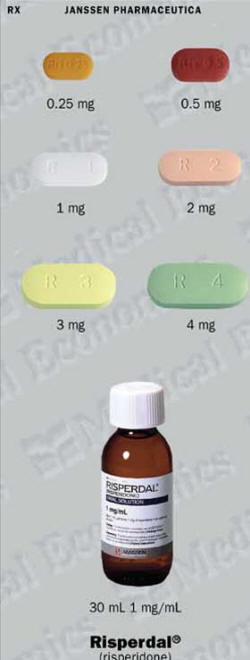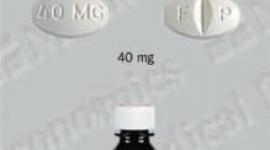Risperdal (Risperidone) Patient Information
Find out why Risperdal is prescribed, side effects of Risperdal, Dilantin warnings, effects of Risperdal during pregnancy, more - in plain English.
Generic name: Risperidone
Brand name: Risperdal
Pronounced: RIS-per-dal
Risperdal full prescribing information
Why is Risperdal prescribed?
Risperdal is prescribed for the treatment of schizophrenia, the crippling mental disorder that causes victims to lose touch with reality. Risperdal is thought to work by muting the impact of dopamine and serotonin, two of the brain's key chemical messengers.
Most important fact about this drug
Risperdal may cause tardive dyskinesia, a condition that causes involuntary muscle spasms and twitches in the face and body. This condition can become permanent and is most common among older people, especially women. Tell your doctor immediately if you begin to have any involuntary movement. You may need to discontinue Risperdal therapy.
How should you take this medication?
Do not take more or less of this medication than prescribed. Higher doses are more likely to cause unwanted side effects.
Risperdal may be taken with or without food.
Risperdal oral solution comes with a calibrated pipette to use for measuring. The oral solution can be taken with water, coffee, orange juice, and low-fat milk, but not with cola drinks or tea.
Risperdal orally disintegrating tablets come in blister packs and should not be removed from the package until you are ready to take them. When it's time for your dose, use dry fingers to peel back the foil of the blister pack to remove the tablet; do not push the tablet through the foil because this could damage the tablet. Immediately place the tablet on your tongue. The medication dissolves in the mouth quickly and can be swallowed with or without liquid. You should not split or chew the orally disintegrating tablets.
--If you miss a dose...
Take it as soon as you remember. If it is almost time for your next dose, skip the one you missed and go back to your regular schedule. Do not take 2 doses at once.
--Storage instructions...
Store at room temperature. Protect tablets from light and moisture; protect oral solution from light and freezing.
What side effects may occur?
Side effects cannot be anticipated. If any develop or change in intensity, tell your doctor as soon as possible. Only your doctor can determine if it is safe for you to continue taking Risperdal.
-
More common side effects may include: Abdominal pain, abnormal walk, agitation, aggression, anxiety, chest pain, constipation, coughing, decreased activity, diarrhea, difficulty with orgasm, diminished sexual desire, dizziness, dry skin, erection and ejaculation problems, excessive menstrual bleeding, fever, headache, inability to sleep, increased dreaming, increased duration of sleep, indigestion, involuntary movements, joint pain, lack of coordination, nasal inflammation, nausea, overactivity, rapid heartbeat, rash, reduced salivation, respiratory infection, sleepiness, sore throat, tremor, underactive reflexes, urination problems, vomiting, weight gain
-
Less common side effects may include: Abnormal vision, back pain, dandruff, difficult or labored breathing, increased saliva, sinus inflammation, toothache
Why should this drug not be prescribed?
If you are sensitive to or have ever had an allergic reaction to Risperdal or other major tranquilizers, you should not take this medication.
Risperdal should not be used to treat elderly patients who have dementia because the drug could increase the risk of stroke.
Special warnings about this medication
You should use Risperdal cautiously if you have kidney, liver, or heart disease, seizures, breast cancer, thyroid disorders, or any other diseases that affect the metabolism (conversion of food into energy and tissue). Use caution, too, if you've had a stroke or mini-strokes, suffer from fluid loss or dehydration, or expect to be exposed to extremes of temperature.
Be aware that Risperdal may mask signs and symptoms of drug overdose and of conditions such as intestinal obstruction, brain tumor, and Reye's syndrome (a dangerous neurological condition that may follow viral infections, usually occurring in children). Risperdal can also cause difficulty when swallowing, which in turn can cause a type of pneumonia.
Risperdal may cause Neuroleptic Malignant Syndrome (NMS), a condition marked by muscle stiffness or rigidity, fast heartbeat or irregular pulse, increased sweating, high fever, and high or low blood pressure. Unchecked, this condition can prove fatal. Call your doctor immediately if you notice any of these symptoms. Risperdal therapy should be discontinued.
Patients at high risk for suicide attempts will be prescribed the lowest dose possible to reduce the risk of intentional overdose.
This drug may impair your ability to drive a car or operate potentially dangerous machinery. Do not participate in any activities that require full alertness if you are unsure of your ability.
Risperdal can cause orthostatic hypotension (low blood pressure when rising to a standing position), with dizziness, rapid heartbeat, and fainting, especially when you first start to take it. If you develop this problem, report it to your doctor. He can adjust your dose to reduce the symptoms.
Be sure to tell your doctor if you have phenylketonuria and must avoid the amino acid phenylalanine, since Risperdal contains this substance.
Possible food and drug interactions when taking this medication
 If Risperdal is taken with certain other drugs, the effects of either can be increased, decreased, or altered. It is especially important to check with your doctor before combining Risperdal with the following:
If Risperdal is taken with certain other drugs, the effects of either can be increased, decreased, or altered. It is especially important to check with your doctor before combining Risperdal with the following:
Blood pressure medicines such as Aldomet, Procardia, and Vasotec
Bromocriptine mesylate (Parlodel)
Carbamazepine (Tegretol)
Clozapine (Clozaril)
Fluoxetine (Prozac)
Levodopa (Sinemet, Larodopa)
Quinidine (Quinidex)
Risperdal tends to increase the effect of blood pressure medicines.
You may experience drowsiness and other potentially serious effects if Risperdal is combined with alcohol and other drugs that slow the central nervous system such as Valium, Percocet, Demerol, or Haldol.
Check with your doctor before taking any new medications.
Special information if you are pregnant or breastfeeding
The safety and effectiveness of Risperdal during pregnancy have not been adequately studied. If you are pregnant or plan to become pregnant, tell your doctor immediately. Risperdal makes its way into breast milk, so women taking Risperdal must avoid breastfeeding.
Recommended dosage
ADULTS
Doses of Risperdal can be taken once a day, or divided in half and taken twice daily. The usual dose on the first day is 2 milligrams or 2 milliliters of oral solution. On the second day, the dose increases to 4 milligrams or milliliters, and on the third day rises to 6 milligrams or milliliters. Further dosage adjustments can be made at intervals of 1 week. Over the long term, typical daily doses range from 2 to 8 milligrams or milliliters.
If you have a liver or kidney disease, your doctor will have you start with one-half of a 1-milligram tablet or 0.5 milliliter of oral solution twice daily and may then increase your dosage by one-half tablet or 0.5 milliliter per dose. Increases above the 1.5-milligram level are typically made at 1 week intervals.
CHILDREN
The safety and effectiveness of Risperdal in children have not been established.
OLDER ADULTS
Older adults generally take Risperdal at lower doses. The usual starting dose is one-half of a 1-milligram tablet or 0.5 milliliter of oral solution twice daily. Your doctor may increase the dose gradually and possibly switch you to a once-a-day dosing schedule after the first 2 to 3 days of drug therapy.
Overdosage
Any medication taken in excess can have serious consequences. If you suspect an overdose of Risperdal, seek medical attention immediately.
- Symptoms of Risperdal overdose may include Drowsiness, low blood pressure, rapid heartbeat, sedation
Risperdal full prescribing information
Detailed Info on Signs, Symptoms, Causes, Treatments of Schizophrenia
APA Reference
Staff, H.
(2009, January 3). Risperdal (Risperidone) Patient Information, HealthyPlace. Retrieved
on 2026, January 14 from https://www.healthyplace.com/other-info/psychiatric-medications/risperdal-risperidone-patient-information
